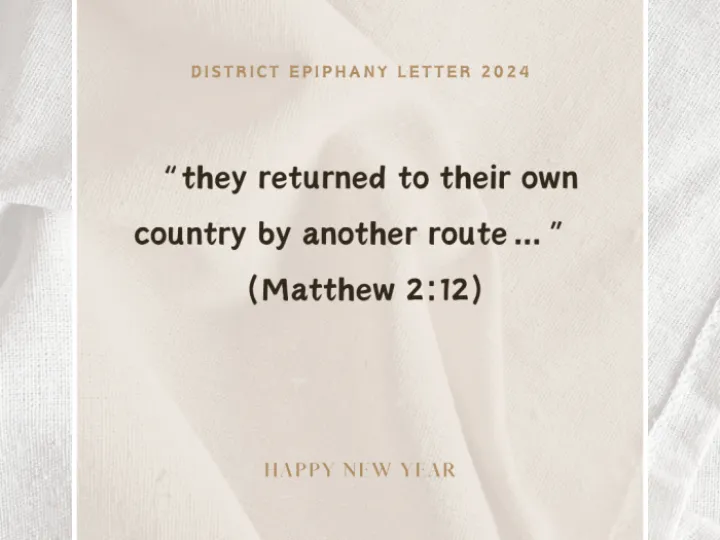Epiphany Letter 2024
January 2024
'...they returned to their own country by another route...' (Matthew 2:12)
Dear friends,
I write on the eve of Epiphany and at the beginning of a weekend where many of you will be preparing to take part in an Annual Covenant Service. I spent part of this afternoon taking down Christmas decorations leaving a manse which suddenly feels quite spartan in comparison with the sense of festival which has permeated the house over the past couple of weeks. One familiar tradition encourages us to take down the decorations by the 12th day: strange in some ways given that this coincides with the celebration of wise strangers bringing their gifts of gold, frankincense and myrrh. There are, of course, other traditions. Orthodox churches celebrate Christmas on January 7th rather than December 25th: something highlighted recently by the conflict in Ukraine and its decision to abandon the Eastern for the Western date of Christmas. Other churches, including cathedrals, will maintain a nativity scene all the way through until Candlemas (February 2nd).
Whether we view Epiphany as the close of Christmas or a moment within a wider and longer Christmas season, it is worth stopping and reflecting on some of its key themes as we remember in the coming weeks the journey of the Magi, the baptism of Jesus and the calling of the first disciples. The story of the Magi, in particular, is one we might find ourselves quickly bypassing as we rush into the busyness of a new year. I was struck as I re-read the story in Matthew 2:1-12 by two things. First was an insight from Rowan Williams reflecting on T.S. Eliot's poem, Journey of the Magi. He writes:
'Epiphany is not simply the blazing fulfilment of all you ever longed for; it as at least as much the subdued, chastened recognition of how much baggage has to be shed, how much self-comforting drama and glamour need to be brought up against a truth that is raw, plain, absolutely demanding, absolutely non-negotiable.' (A Century of Poetry: 100 Poems for Searching the Heart, p.92)
The Magi are changed by their experience both as they journey towards the Christ-child and as they journey away, by a '...different route.' This challenging insight is an interesting one to place alongside the Covenant Prayer, perhaps the most demanding discipleship prayer ever written particularly if we take it seriously. The second insight is perhaps a little more obvious. Matthew includes this story as a sign that the ministry and person of Jesus is a gift to all the nations: it is Matthew, of course, who includes the command of Jesus to the disciples to go to all the nations (28:19). I was reminded of this when I received a reply this morning to an email from a connexional colleague. A banner at the foot of the email read, 'Unbounded Love: God's Love doesn't stay within the lines.' The Magi are a symbol of this. But it ought also to remind us of a core feature of a Methodist Christian identity and a stimulus to individuals and churches as we make our covenant promises not to bind ourselves too closely to where we currently are but to journey out where love leads, trusting that God will lead us into new places where love, grace and mercy will be found.
I pray God's blessing upon you, your loved ones and all our Methodist communities as begin a new year together.
Happy New Year!
Revd Richard Andrew
Chair, Darlington District

